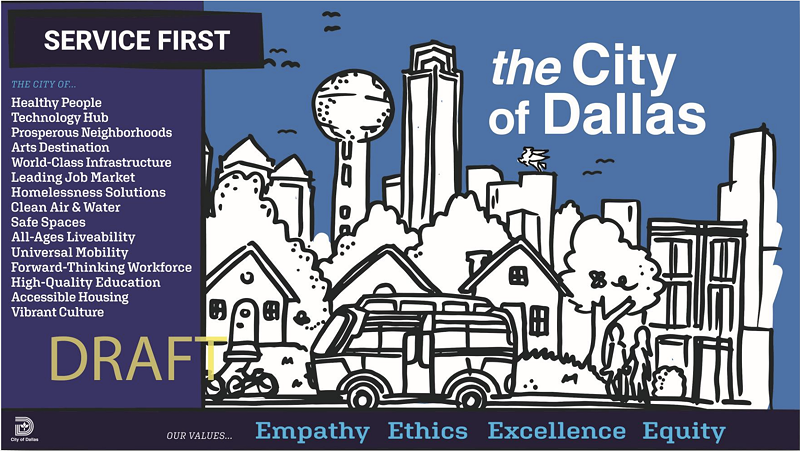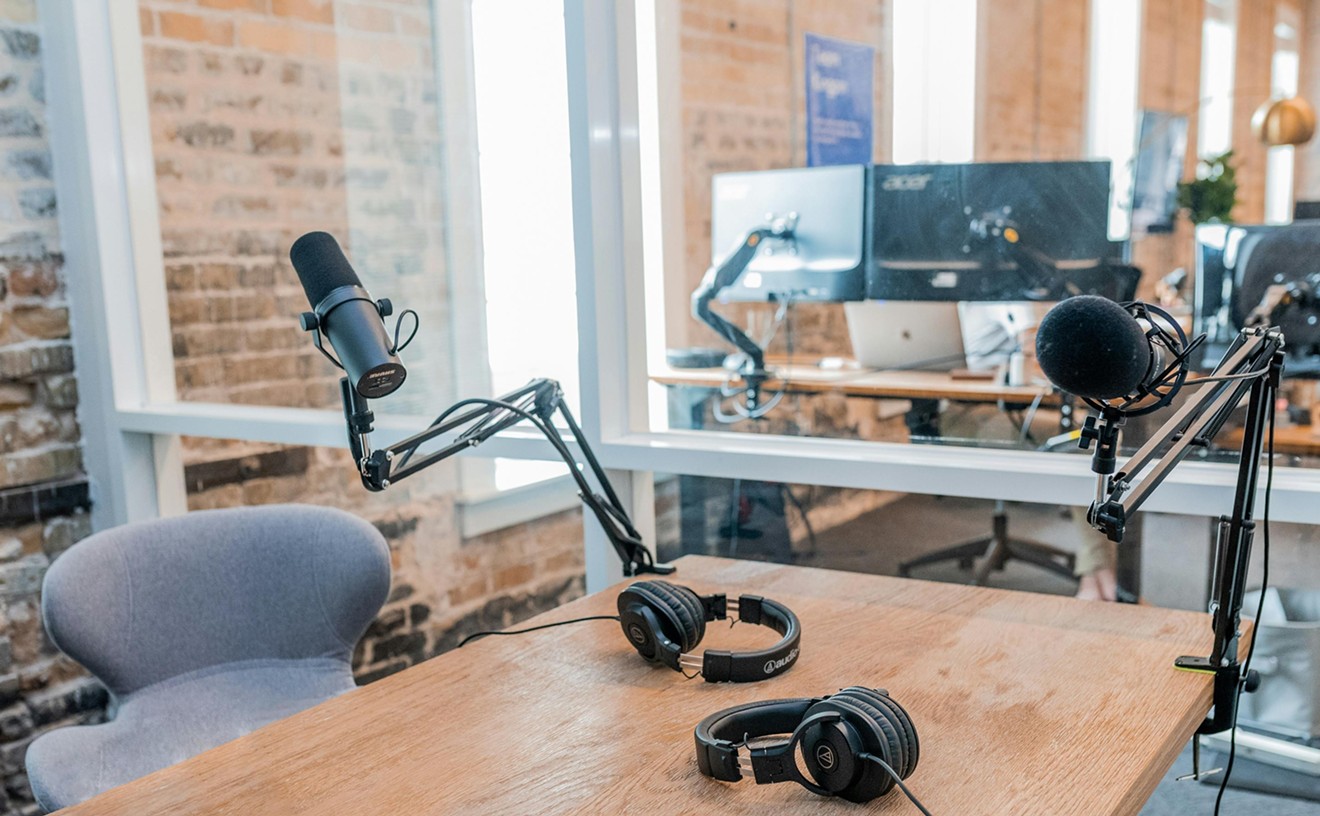Last month, the Dallas City Council met for a daylong retreat at the city's new Holocaust museum. It included, apparently, a dance party.
"Mayor, you really did get the best dance," said Kimberly Tolbert, the city manager's chief of staff, at a briefing last week. "Just continue to remain light on your feet."
During the retreat, Council members also found time to brainstorm a list of more than 100 "priority" initiatives they would focus on in the coming years. Last week, they ranked their favorites. And so did you.
First, the results from our reader poll, which by Tuesday afternoon had garnered 100 responses:
The winning proposal was to plant more trees, which was selected in nearly half of the responses. A 2017 study by the Texas Trees Foundation laid out a rationale for the idea, recommending the city plant 250,000 trees across the city to help cool the city's "heat islands."
Progress toward implementing the plan began last year, with the city announcing a partnership with the foundation to develop a "Urban Forestry Master Plan." It will be released in "late summer or early fall," according to a foundation spokesperson.
Coming in second, with 44 votes, was a proposal to recruit more police officers. As violent crime has risen in recent years, Dallas has struggled with the question of how many police officers is enough. It commissioned the consulting firm KPMG to answer the question last year, but their final report didn't provide a firm answer.
As of January, the department had 3,150 — up from around 3,000 a few years ago — with an "ideal" number of 3,500 to 3,600, according to Assistant Chief David Pughes. But city leaders and criminal justice advocates have warned of the dangers of over-policing, particularly in areas of southern Dallas that are targeted under the department's new violent crime reduction plan.
Finally, a proposal for more "transit oriented development," particularly in southeastern Dallas, came in third, with 40 votes. Advocates say that additional residential development near DART stations will help solve the city's lack of affordable housing and take polluting cars off the road. But making these projects a reality requires clearing a gantlet of political hurdles, from zoning battles to the need for significant taxpayer investment.
And then, of course, you came up your own ideas. One respondent declined all of the city's proposals, instead offering: "Let Jim's Car Wash start operating again."
But enough from the rabble. Last Monday, Council members were presented with iPads, preloaded with the same list of possible initiatives, and asked to pick their top ideas for each committee. On Wednesday, the city manager's office briefed the Council on the results.
On the City Council's ballots, planting trees got beaten out by a proposal to address bulk trash and illegal dumping. A 2018 report commissioned by the city found it spent essentially nothing on preventing littering and illegal dumping, unlike other Texas cities. James McGuire, the head of the city's Office of Environmental Quality, said the city is implementing some of the report's recommendations.
When it came to public safety, recruiting more police officers didn't crack the council's top three. Instead, "proper response times for emergency services" won out. The Observer reported earlier this year that the city was failing to meet the national standard for emergency medical service response times, a goal set in 2019. Meeting that goal would have required substantial investment. Instead, the city moved the goalposts.
Under transportation, council members favored fixing the city's traffic signals over other public transit-related proposals. More than half of the city's stop lights are more than 40 years old and are long past their expected life span. City officials have admitted that they don't have the necessary funding to address the problem.
Other initiatives that got widespread support from the Council included kick-starting 1,000 new small business and "deploy[ing] innovation and upgrade technology."
Council members were mixed on the best way to fight homelessness: expanding shelters, spending down that $20 million in bond funding and utilizing the controversial housing policy task force got six votes apiece.
Going forward, Tolbert promised accountability. The city manager's office, she said, would be "reporting out to the various committees to ensure you know the progress we're making" on the chosen initiatives.
[
{
"name": "Air - MediumRectangle - Inline Content - Mobile Display Size",
"component": "18855504",
"insertPoint": "2",
"requiredCountToDisplay": "2",
"watchElement": ".fdn-content-body",
"astAdList": [
{
"adType": "rectangle",
"displayTargets": "mobile"
}
]
},{
"name": "Editor Picks",
"component": "17105533",
"insertPoint": "4",
"requiredCountToDisplay": "1",
"watchElement": ".fdn-content-body",
"astAdList": [
{
"adType": "rectangle",
"displayTargets": "desktop|tablet"
},{
"adType": "rectangle",
"displayTargets": "desktop|tablet|mobile"
}
]
},{
"name": "Inline Links",
"component": "18349797",
"insertPoint": "8th",
"startingPoint": 8,
"requiredCountToDisplay": "7",
"maxInsertions": 25
},{
"name": "Air - MediumRectangle - Combo - Inline Content",
"component": "17105532",
"insertPoint": "8th",
"startingPoint": 8,
"requiredCountToDisplay": "7",
"maxInsertions": 25,
"watchElement": ".fdn-content-body",
"astAdList": [
{
"adType": "rectangle",
"displayTargets": "desktop|tablet"
},{
"adType": "rectangle",
"displayTargets": "desktop|tablet|mobile"
}
]
},{
"name": "Inline Links",
"component": "18349797",
"insertPoint": "8th",
"startingPoint": 12,
"requiredCountToDisplay": "11",
"maxInsertions": 25
},{
"name": "Air - Leaderboard Tower - Combo - Inline Content",
"component": "17105535",
"insertPoint": "8th",
"startingPoint": 12,
"requiredCountToDisplay": "11",
"maxInsertions": 25,
"watchElement": ".fdn-content-body",
"astAdList": [
{
"adType": "leaderboardInlineContent",
"displayTargets": "desktop|tablet"
},{
"adType": "tower",
"displayTargets": "mobile"
}
]
}
]












